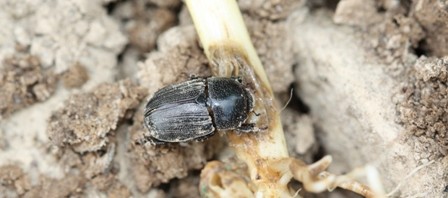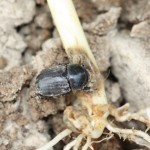I’ve had a number of questions about including insecticide with fungicide applications. In almost all cases, there are not significant insect infestations in the field. It is purely a convenience application. In fact, most reports are of light aphid and cereal leaf beetle infestations, and little or no armyworm activity. Some have used the logic that insect populations are ahead of schedule, but so is the wheat. At this time of year, insecticides should be applied as needed based on Continue reading
All posts by Scott Stewart, West TN Research & Education Center
Follow UTcrops on Twitter
You can now follow us on Twitter, UTcrops@UTcrops. Receive a tweet as news updates are posted on our blog, and re-tweet articles to your followers.

Sugarcane Beetles in Corn; Cereal Leaf Beetle in Wheat
 My counterpart, Dominic Reisig, in North Carolina wrote a couple of good articles that are worth a look (linked below). Sugarcane beetles, like just about everything else, are out early this year. Ed Burns, Extension Agent in Franklin County, reported “about a hundred beetles” at his shop lights last week. I typically start getting calls about this pest beginning in early May, but count on potential problems to start earlier this year.
My counterpart, Dominic Reisig, in North Carolina wrote a couple of good articles that are worth a look (linked below). Sugarcane beetles, like just about everything else, are out early this year. Ed Burns, Extension Agent in Franklin County, reported “about a hundred beetles” at his shop lights last week. I typically start getting calls about this pest beginning in early May, but count on potential problems to start earlier this year.
Sugarcane beetles are active (Dominic Reisig, NCSU)
Cereal leaf beetle update (Dominic Reisig, NCSU)
Bt Corn Refuge Requirements Revisited
My colleague, Angus Catchot at Mississippi State University wrote a good news article addressing Bt corn refuge requirements. Keep in mind that his comments are for Mississippi, and things change for non-cotton growing areas of Tennessee … those not officially designated as “cotton counties” (see below).
You can read Dr. Catchot’s comments on his blog site at http://www.mississippi-crops.com/2012/03/01/the-corn-refuge-conundrum-for-the-south/. Continue reading
Slides Shows from Irrigation Workshop
A number of people asked if we could make available the slides used during the Irrigation Workshop that was held in Jackson on February 23rd. The slide shows can now be viewed at http://www.utcrops.com/presentations.htm.
Cotton Focus Meeting
There’s a slight change to the annual University of Tennessee Cotton Focus. This year it will be held in conjunction with the Mid-South Farm and Gin Show in Memphis, Tennessee. The Gin Show takes place on March 2-3, with the UT Cotton Focus scheduled for Continue reading
Wheat growth and development
Warm weather this winter has many wheat fields progressing at a faster than normal pace. Several questions have been asked recently if we are setting up for a repeat of the 2007 Easter freeze. Continue reading
Changes in USDA NRCS Conservation Programs
The following information was provided by Wade Moder (IPM Institute of North America).
For FY 2012, the USDA Natural Resources Conservation Service (NRCS) has made significant changes to conservation programs to streamline procedures, reduce costs and improve consistency. These changes will impact grower support from the Environmental Quality Incentives Program (EQIP), including for IPM. The following Continue reading
